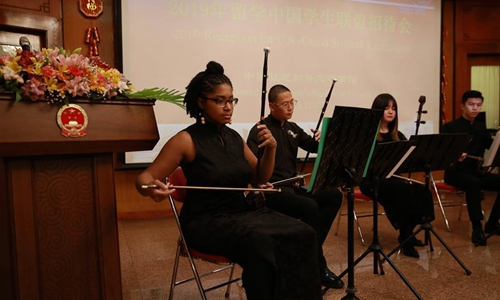HOME >> OPINION
US universities shouldn’t incite ideological tension
By Yu Jincui Source:Global Times Published: 2019/12/29 21:52:03

A band from Valparaiso University performs traditional Chinese music at a reception in Chicago, the US, on December 7, 2019. The Chinese Consulate General in Chicago held a reception to promote cultural and people-to-people exchanges between China and the United States. Photo: Xinhua/Wang Ping
Is China an ideological foe to the West? With China's continuous rise, the answer is "yes" for many Westerners. A dangerous trend now is that China's political system is increasingly seen as a rival to the so-called "Western democracy and freedom" in the West and the US. More worryingly, some are trying to push universities to the forefront of a potential ideological confrontation with China.
An article in The Atlantic on Saturday accused China of encroaching on US "social and political discourse." It called on all American universities to stand up to China against the attempt of the Communist Party of China at constraining "how people in the US and other Western democracies talk about China," suggesting the universities should routinely hold events on "sensitive" topics such as the fate of Taiwan, the pro-democracy protests in Hong Kong and the repression of Uyghur Muslims in Xinjiang.
The Atlantic article cited China's response to the hosting of Dalai Lama as a commencement speaker by the University of California at San Diego in 2017 as a case to show Beijing is trying to influence open US dialogue about China. The article didn't mention that no country would allow any foreign institution to invite separatist forces and treat them as dignitaries.
Universities are supposed to facilitate mutual understanding between countries. China is rising with a model different from that of the West and concerns are growing that China poses a threat to Western values, economics and security. At such a time, universities should pay more attention to study the China development model, objectively analyze the Chinese political system and values that have contributed to the achievements the country has made over the past decades.
China has no intention to interfere in freedom of speech on American campuses about China-related sensitive topics, but if the events are provocative or the discussions ideologically driven or biased, they will only lead to more tensions and fuel more prejudices against China.
China's governance and political systems are different from those of the West. What's more important for Western universities is to understand how the Chinese system came into being, developed and functioned in reform and opening-up over the past four decades.
Without the current system, a moderately prosperous society in all respects couldn't have been so near realization in China.
The West needs to face up to the reality and acknowledge the merits of the Chinese system. American political scientist Francis Fukuyama's "end of history" theory has influenced a great number of Westerners, making them stubbornly believe Western liberal democracy is universal. As Western democracy is in decline, it's time for them to overcome their stereotyped views.
Western universities should take the lead to foster a fair understanding of China.
Posted in: OBSERVER